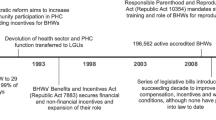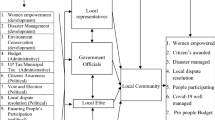Abstract
There is increasing global interest in women empowerment and the ways in which rural women are involved and supported in community development. Women empowerment, a vital component of community development, is closely linked to the achievement of Sustainable Development Goal 5 in the United Nations Transforming our world: the 2030 Agenda for Sustainable Development which is geared toward achieving gender equality and empowering women and girls by the year 2030. While there is broad consensus about the importance of women empowerment for economic growth, scant attention is given to how community development principles inform community projects aimed at empowering women. Using a single-case study research design, the article explores the extent to which principles of community development (such as self-help, self-growth, felt need, citizenship participation, self-reliance and self-direction) are employed by a Nigerian-based non-governmental women’s organisation in empowering vulnerable and disadvantaged women in the rural context of Ondo State, Nigeria. A systematic document review of the organisation’s published bulletins, journal articles, annual reports and social media posts about its empowerment activities were analysed as part of the study. The case study shows that when women beneficiaries are actively and inextricably involved in the design and implementation of programmes intended to improve their livelihoods, the impact is exponential, and the results are achieved expeditiously. The article argues for community development programme planners and implementers to see women beneficiaries as active contributors and participants to their development instead of conceiving of them as passive recipients, and consumers of palliative interventions.

Similar content being viewed by others
References
Abiona, A. I. (2009). Principles and Practice of Community Development. Ibadan University Press.
Adams, T., Gerber, J. D., & Amacker, M. (2019). Constraints and opportunities in gender relations: Sugarcane outgrower schemes in Malawi. World Development, 122, 282–294.
Adebo, G. M., & Ewuola, S. O. (2005). Impact of micro credit and effective communication system on income of women in Ondo and Ekiti States of Nigeria. Journal of Agricultural Extension, 8.
Agboeze, M. U., & Nwankwo, E. A. (2013). Indigenous Communities and community development principles in South-East Nigeria: challenges and prospects. Developing Country Studies, 3(10), 85–93.
Ajadi, K. O., Adebisi, J. A., & Alabi, F. M. (2010). Assessment of the impact of women’s organisations on sustainable rural environment and livelihood in Nigeria. Ethiopian Journal of Environmental Studies and Management, 3(2), 86–95.
Ajayi, R., & Otuya, N. (2006). Women’s participation in self-help community development projects in Ndokwa agricultural zone of Delta State. Nigeria. Community Development Journal, 41(2), 189–209.
Arum, I., & Alaba-Agagu, A. (2017). Non-governmental organisations and women political participation in Ondo State. Nigeria. International Journal of Case Studies, 6(4), 18–26.
Asaolu, I. O., Alaofè, H., Gunn, J. K., Adu, A. K., Monroy, A. J., Ehiri, J. E., & Ernst, K. C. (2018). Measuring women’s empowerment in sub-Saharan Africa: exploratory and confirmatory factor analyses of the demographic and health surveys. Frontiers in Psychology, 9, 994.
Baum, H. S., Neil, J. S., & Paul, B. B. (2001). Citizen participation International Encyclopedia of the Social & Behavioral Sciences. Retrieved from https://www.sciencedirect.com/topics/social-sciences/citizens-involvement (20 February 2021).
Bowen, G. A. (2009). Document analysis as a qualitative research method. Qualitative Research Journal., 9(2), 27–40.
Cornwall, A. (2016). Women’s empowerment: what works? Journal of International Development, 28(3), 342–359.
Cronin-Furman, K., Gowrinathan, N., & Zakaria, R. (2017). Emissaries of Empowerment. New York: Colin Powell School for Civic and Public Leadership, The City College of New York. Retrieved at http://www.deviarchy.com/wp/wp-content/uploads/2017/09/EMISSSARIES-OF-EMPOWERMENT-2017.pdf2017/09/EMISSSARIES-OF-EMPOWERMENT-2017.pdf (15 February 2020).
Duflo, E. (2012). Women empowerment and economic development. Journal of Economic Literature, 50(4), 1051–79.
Fasoranti, M. M. (2008). Economic implication of poverty alleviation programs on rural women in Ondo-State Case Study of Country Women Association of Nigeria. Journal of Social Science, 4(4), 352–357.
Fonchingong, C. C., & Fonjong, L. N. (2002). The concept of self-reliance in community development initiatives in the Cameroon grassfields. Geo Journal, 57(1), 83–94.
Ganle, J. K., Afriyie, K., & Segbefia, A. Y. (2015). Microcredit: empowerment and disempowerment of rural women in Ghana. World Development, 66, 335–345.
Gilchrist, A., & Taylor, M. (2016). The Short Guide to Community Development 2e. Bristol: Policy Press.
Gumbi, S. P., Ndlovu, N. B., & Olaniran, S. O. (2020). Challenges experienced by women caregivers of orphans and vulnerable children in KwaDlangezwa Kwazulu Natal. Journal of Gender, Information and Development in Africa, 9(2), 205–218.
Haque, M., Islam, T. M., Tareque, M. I., & Mostofa, M. (2011). Women empowerment or autonomy: a comparative view in Bangladesh context. Bangladesh e-journal of Sociology, 8(2), 17–30.
Hartley, J. (2014). Case studies in organisational research. In C. Cassell & G. Symon (Eds.), Qualitative Methods in Organisational Research: A Practical Guide (pp. 208–230). Sage.
Hashemi, S. M., & Schuler, S. R. (1993). Defining and studying empowerment of women: a research note from Bangladesh. Arlington, Virginia: JSI Working Paper, (3).
Hearn, J., Lämsä, A., Biese, I., Heikkinen, S., Louvrier, J., Niemistö, C., Koskinen, P. (2015). Opening new opportunities for gender equality work. Helsinki: Edita Publishing (Hanken School of Economics Research Reports 76).
Hivos (2020). Women empowerment. Retrieved from https://www.hivos.org/focus-area/womens-empowerment/ (3 May 2020).
Josephson, B. (2017). The Nigerian Welfare State System. The Routledge International Handbook to Welfare State Systems, 178–190.
Latopa, A. A., & Saidu, M.B. (2015). Analysis of Values and Principles of Community development: A response to the Challenges of Real World Situations. Retrieved from https://d1wqtxts1xzle7.cloudfront.net/48382183/Published_2015_by_UNILORIN.pdf?1472397153=&response-content-disposition=inline%3B+filename%3DAnalysis_of_Values_and_Principles_of_Com.pdf&Expires=1615998368&Signature=HJnJ2O4colQCN2Py9RbonmU8XnbgBCB~jUvVsHleeSKVSqvhWZDVio8AO1I5U-sfdxleA03OWGDbicgkzjp~u2zfM9essOaNkYpdfK2Ru-3e-M9zifT-U1TNCngtWTfs388a6Jm-l~r2cwXr~V9lUrqvpLg8f08-aQGD3ZGCA52Q~kw7ZqNDB9AU99jnVEKhbn39B0NGNbMYVgh~b4OSGXf~EkUtODefdnNhw2BGFn~qRIFGMLHNhqyHpKea8Gga7J-QeBGZJktdQwfD9EhJ2vjsBzx7uYr5vh5Pt5ZDJHgl6Bpq77RONhTHQKrTN7hZtrk61QdJK-ZLfT-MNorZmQ__&Key-Pair-Id=APKAJLOHF5GGSLRBV4ZA (15 February 2021).
Lemut, T. I. (2017). An assessment of the provision of micro-credit for women empowerment in Plateau State, Nigeria. Geografia-Malaysian Journal of Society and Space, 13(2).
Longwe, S. H. (2000). Towards realistic strategies for women's political empowerment in Africa. Gender & Development, 8(3), 24–30.
Lucas, E. T. (2000). We decide, they decide for us: popular participation as an issue in two Nigerian women’s development programmes. Africa Development, 25(1), 75–98.
Lucas, E. (2001). Social development strategies of a non-governmental grassroots women’s organisation in Nigeria. International Journal of Social Welfare, 10(3), 185–193.
Martinez, C., & Franks, D. M. (2014). Does mining company-sponsored community development influence social licence to operate? Evidence from private and state-owned companies in Chile. Impact Assessment and Project Appraisal, 32(4), 294–303.
Modupe, F. M. (2008). Economic implication of poverty alleviation programs on rural women in Ondo-State: Case study of Country Women Association of Nigeria. Journal of Social Sciences, 4(4), 352–357.
Norman, N. D. (2012). An investigation into the reasons for failure of community-based projects at Folovhodwe, Limpopo. Mini dissertation submitted in partial fulfilment of the degree of Magister Technologiae: Business Administration. UNISA. Pretoria.
Okoko, E. E., & Olanrewaju, D. O. (2000). The involvement of non-governmental organisations in poverty alleviation in Akure, Nigeria. The Nigerian Journal of Economic and Social Studies, 42(2), 201–212.
Olaniran, S. O., & Baruwa, I. B. (2020). Ethical considerations in adult and community education research in Nigeria: issues and perspectives. International Journal for Educational Integrity, 16(1), 1–10.
Olujide, M. G. (2005). Assessment of micro-credit supply by country women association of Nigeria (COWAN) to rural women in Ondo State Nigeria. Editorial Advisory Board, 20(4), 737–745.
Olujide, M. G. (2007). Micro credit supply by Country Women Association of Nigeria (COWAN) to rural women in Ondo State Nigeria. Research Journal of Applied Sciences, 2(6), 740–744.
Onyenemezu, E., & Olumati, E. S. (2013). The imperativeness of felt needs in community development. Journal of Education and Practice, 4(2), 156–159.
Onyeozu, A. M. (2007). Understanding community development. Port Harcourt: Davidstones Publishers Ltd.
Parker, B. (2002). Planning analysis: the theory of citizen participation. Retrieved at https://pages.uoregon.edu/rgp/ (4 June 2020).
Perumal, J. C. (2003). Identifying and responding to barriers impacting women educators. South African Journal of Higher Education, 17(1), 74–82.
Perumal, J.C. (2009). Reading and creating critically leaderful schools that make a difference: the post-apartheid South Africa case. International Journal of Leadership in Education. Feb. pp. 35–49.
Priti, C., & Tiwary, R. (2020). Impact of skill building on women empowerment: a case study of petals craft. Studies in Indian Place Names, 40(3), 5435–5443.
Salau, E. S., Onwubuya, E. A., & Saingbe, N. D. (2012). An assessment of Country Women Association of Nigeria (Cowan) programmes in Nasarawa state, Nigeria. Production, Agriculture and Technology, 8(1), 66–79.
Sheriff, H. (2020). Felt needs community development theory. Retrieved from https://www.useful-community-development.org/felt-needs-community-development-theory.html (20 May 2020).
Spicker, P. (2020). An introduction to Social Policy. Retrieved at http://www.spicker.uk/social-policy/need.htm (4 June 2020).
Stake, R. E. (1995). The art of case study research. Sage.
United Nations (2019). UN Summit on Sustainable Development Goals kickstarts ambitious action to deliver for people and the planet. Retrieved from https://www.un.org/sustainabledevelopment/blog/2019/09/un-sdg-summit-opens/ (05 February 2020).
Van Schalkwyk, B. B. (2015). Challenges in realising sustainable community development in rural South Africa. Agriculture, Forestry and Fisheries, 4(4), 73.
Wade, J. L. (1989). Felt needs and anticipatory needs: reformulation of a basic community development principle. Community Development, 20(1), 116–123.
Yin, R. K. (2014). Case study research: Design and methods (applied social research methods). Thousand Oaks, CA: Sage publications.
Zainal, Z. (2007). Case study as a research method. Jurnal Kemanusiaan, 5(1). Retrieved from http://psyking.net/htmlobj-3837/case_study_as_a_research_method.pdf (18 May 2020).
Author information
Authors and Affiliations
Corresponding author
Ethics declarations
Informed Consent
No informed consent was necessary because secondary data was used.
Conflict of Interest
The authors declare that there is no conflict of interest.
Rights and permissions
About this article
Cite this article
Olaniran, S.O., Perumal, J. Enacting Community Development Principles in Women Empowerment Projects: a Case Study in Ondo State, Nigeria. Glob Soc Welf 8, 151–158 (2021). https://doi.org/10.1007/s40609-021-00210-x
Accepted:
Published:
Issue Date:
DOI: https://doi.org/10.1007/s40609-021-00210-x




